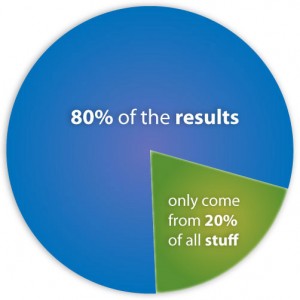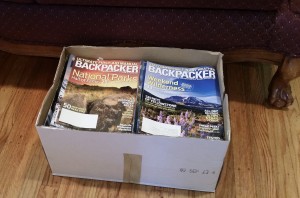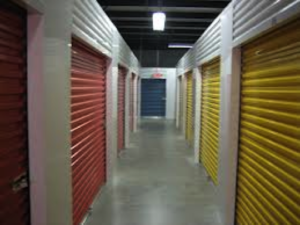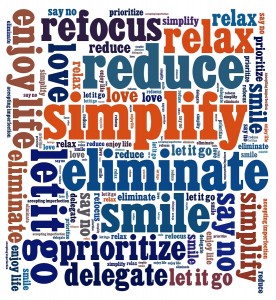 Ever heard of the 80/20 rule? An Italian economist, Vilfredo Pareto, first talked about it roughly 100 years ago, when he observed that 80% of Italy’s wealth was in the hands of 20% of the population. Since then, the “Pareto Principle” has been found to have widespread applicability: in most situations, 80% of the benefits come from 20% of the causes.
Ever heard of the 80/20 rule? An Italian economist, Vilfredo Pareto, first talked about it roughly 100 years ago, when he observed that 80% of Italy’s wealth was in the hands of 20% of the population. Since then, the “Pareto Principle” has been found to have widespread applicability: in most situations, 80% of the benefits come from 20% of the causes.
There are many everyday examples of the 80/20 Rule.
The Pareto Principle is enlightening to me when I apply it to my clients’ complicated relationship with paper.
I think Pareto was onto something here. Could it be that in any stack of ten papers, roughly two of them are truly valuable? Could we train ourselves to zero in on those vital two and let the other eight go without agony or regret? What do you think?
Still struggling? Professional organizers are compassionate helpers skilled at guiding their clients to zero in on that valuable 20% worth keeping, whether it’s paper, household clutter, or excessive time commitments. Use the Find An Organizer feature on this web site to locate an organizer near you.
Click on the title above to learn more about the featured author.
 Is this the year you’re planning to make your big move? Have you been saving to buy a home? Thinking about retiring and downsizing? Planning on a job change? Want to move closer to the grandkids?
Is this the year you’re planning to make your big move? Have you been saving to buy a home? Thinking about retiring and downsizing? Planning on a job change? Want to move closer to the grandkids?
Whatever the reason, there are things you can and should assess and address. One big consideration is the cost. Between packing materials, moving trucks, mileage and manpower, a relocation can run anywhere from 2- to 10-thousand dollars. While some pull it off on a shoestring and others exceed that 10K mark, it is most certainly a costly venture. So what can you do now to identify and avoid unnecessary expenses?
One thing is to take a discriminating look at what, in fact, will have to be moved. This small box of magazines weighs more than 40 lbs! At an average charge of $.50 per pound, that’s $20 (and that’s not even taking into account the labor charge for loading and unloading it). An online subscription to this Backpacker magazine is only $27…for 3 years! Are you sure these magazines, (broken printers, outgrown bikes, etc.) are worth that much to you?
Save your sanity and your budget by lightening your load now. Here are some easy target areas:
Want to know how much you’ve saved by being prepared in advance? Step on the scale with each bag or box you remove and keep track in a notebook or on your cell phone.
Whether you are using a moving company or hauling the load yourself, more stuff means more weight, more time and, bottom line, more money. Since costs incurred in any move include volume, weight and time, the less that is spent on packing and hauling your possessions, the more there will be for other discretionary expenses like unpacking, cleaning, window treatments or furniture updates.
Click on the title above to learn more about the featured author.
No Need to Hold onto Things for the Next Generation
When I give workshops, I am asked over and over again about what should be saved for children; if you don’t have children, you may be saving these things for friends or other family members. Many parents seem to think their children want what they have, so they hold onto items for when these children will appreciate these things. Items range from baby clothes to games to books to schoolwork to china to sterling silver and include tons of paperwork.
I have a client, with whom I have been working, whose father saved every personal and business record. He had checks from 1949 to the day he died. He had his and his wife’s medical records from the 1960’s (both of whom are now deceased), 8 estates that he had settled, and business records back to the 1960’s (including his stationery and business cards – from long retired positions). While everything was very organized and labeled, sorting through it has been a tremendous burden on his daughter.
Two 4-drawer file cabinets, one 2-drawer file cabinet, 2 desks, book shelves, and chairs had been used to store this paperwork. We are shredding and recycling 98% of these records. My client wants to go through everything to make sure there is nothing of value hidden away. We have talked about why her father would have saved all of this and cannot come to any satisfying conclusion.
Not only is there paperwork, but there are also items from grandparents and other relatives. Again, my client is going through all of this to figure out what she wants to keep and what she wants to donate or sell. Since her brother does not live in the area, she has to go through all these things by herself and save some things for him to go through, including his own items.
If you are saving things for your children/friends/other family members, please ask them if they want anything. If they say no, then either sell, donate, recycle, shred, or trash the items. There is no reason for you to hang on to this stuff, unless you really want it. If it is packed away and not being used, and no one in your family wants the items, give them away now so someone else may really be able to appreciate them.
Also, keep on top of your paperwork — shred or recycle old records. Settling an estate can take a lot of time. You can significantly speed up the process by getting rid of paperwork and any unused or unwanted items now.
This type of activity will not be one of your more fun things to do, but it sure will save time and heartache in the future. The lesson my client learned from all of this is to purge and continue to get rid of those things now that she no longer needs or wants. What are you going to do now with your unwanted and unnecessary items and paperwork?
One of the barriers to getting organized is too much CRAP (Clutter that Robs Anyone of Pleasure). It’s work for your brain to filter out distractions in order to get organized, so less clutter— less distractions! To celebrate my 9th year in business, here are Ten More Myths for Not Unloading CRAP for people who truly want to rightsize their belongings. Let’s break it down:
1. “You can never have too many <your item here>.”
This only applies to blessings. Bending over a huge pile of shoes to dig through every day is no way to choose the pair you want, especially if you end up wearing the same five pair.
2. “I have a terrible memory, so I keep my stuff to remind me.”
Memories aren’t in things. And if your memories are packed away in the attic, that’s not honoring them. Also, are your old memories taking up space for new memories?
3. “My <your item here> is going to be worth a lot of money someday.”
Things are only worth what someone is willing to pay for them. The word ‘collectible’ has been overused to the point of preposterous. Look on ebay to see if your item is for sale and at what price. More importantly, has anyone sold an item like yours?
4. “I can’t trust my judgment so I’m afraid to get rid of anything.”
If your knee jerk reaction is to keep something because it’s easier, trust your instincts. If you are 40 years or older, you can trust your instincts about whether you will need something or not.
5. “I’m going to fix that someday.”
Just because you can fix something, doesn’t mean you’ll have time. If a project has been laying around for two years or more, let it go, or pay someone else to fix it!
6. “I can’t trust an auctioneer to pay me what my item is worth.”
There are plenty of reputable auctioneers in our region. On the other hand, you can’t expect to get back what you paid for an item. Call an auctioneer so you can sell many items at once, but don’t expect to get rich.
7. “I have a friend I want to give that to.”
Call that friend to see if he or she wants or needs it before you give it to them. How do you feel when someone drops their stuff on your door step without asking first?
8. “I want to read that someday.”
Set a time limit for reading magazines, clippings and newspapers. Cancel subscriptions if you don’t have the time to read magazines and recycle back issues.
9. “I’m keeping that to sell at a yard sale.”
If you’ve kept items for over two years and haven’t had a yard sale, donate the items. When summer ends, donate any unsold yard sale items and begin collecting for next year’s sale.
10. “My husband won’t get rid of his stuff, so why should I?”
I work with many couples who don’t agree on how and when to let go of clutter. You can only control your belongings so get started! When the CRAP starts to fall away and your spouse sees your relief, he or she may get on board.
Clutter Quote: “Not everything that can be counted, counts. And not everything that counts, can be counted.” -Albert Einstein
 I love the idea that someone can use a storage unit as a business location, a man cave, a wine cellar, or as a place to store their cool sports car.
I love the idea that someone can use a storage unit as a business location, a man cave, a wine cellar, or as a place to store their cool sports car.
I love that a college student can use a storage unit to store their dorm rooms over the summer and that someone can store excess furniture while their house is being marketed for sale.
I love that a builder can use a storage unit to store supplies while they are doing a renovation.
I hate the idea that people are using storage units to store old, dirty appliances, inexpensive furniture, and things that are eventually going to go in the trash, get donated, or get sold.
I hate that people abandon their units with valuable items in storage units and that there are reality TV shows based on this.
During the past couple of weeks, we have worked in storage units, and I am so glad we could help clients get out from under the stuff that was being stored— which had less monetary value than the month’s rent of the unit.
Understandably, people go into storage units for a valid reason initially. In the words of my eloquent husband, “storage units can take on a life of their own.” The items being stored take root in the unit, and the bill is on autopay. This makes it easy to forget or avoid the whole thing.
Many times people no longer know what is in their unit— a hint to me that there is minimal value, emotionally and financially.
Before you make the decision to take on a storage unit, think of the following:
If you answer these questions and can develop a plan, rent the unit.
I hope this advice helps you make a good decision and prevents you from being burdened by a storage unit that takes on a life of its own. If renting a storage unit is the right thing for you, I hope that you have picked up a hint or two to simplify the process.
 Typically in our society, we acquire items, things, and stuff. We use our valuable time to acquire these so called treasures. It may have felt good to collect and accumulate. Yet, when it’s out of control it appears as clutter and usually those feelings change. Overwhelm shows up. That’s the signal, the “red flag”, that it is time to take some action. One action could be evaluating and accessing the reasons you have what you have. We are not talking about items that serve a purpose, are useful, and make your life better.
Typically in our society, we acquire items, things, and stuff. We use our valuable time to acquire these so called treasures. It may have felt good to collect and accumulate. Yet, when it’s out of control it appears as clutter and usually those feelings change. Overwhelm shows up. That’s the signal, the “red flag”, that it is time to take some action. One action could be evaluating and accessing the reasons you have what you have. We are not talking about items that serve a purpose, are useful, and make your life better.
Are you holding on dearly to the “stuff” that:
1. Represents “Who” I am, or “Who” I was, or “Who” I want to become
Do you like any of these “Who’s”? Sometimes they don’t align with who you are presently, or they are reminders of the past, or even reminders of in-completions. If you don’t feel energized or happy with them, then why keep them around?
2. I may need this someday
Future thinking that could keep you up to your eyeballs in excess stuff. It could be said this indicates a lack of trust in the future. Our thoughts can create our reality. If unconsciously your thoughts are coming from a place of lack, you will create that. What do I mean? If you trust that you will have all you need , you will have it!
3. I got this as a gift
Just because your favorite person bought this doesn’t justify saving space for it if you don’t need, want, or like it. Re-gifting or donating gives it a new life from gathering dust or buried in a pile. Using places for unwanted items takes away your precious space.
4. Family relics that have been passed on to me
So maybe you have inherited these things that have no meaning or sentimental value to you. If you feel you want to memorialize the people, choose a few items and get creative. Make a shadow box or a special area to display them. If you will have joy and feel happy seeing these items in your home, then that’s what counts!
5. I feel secure having this/ Can’t have empty space
No matter how many possessions you acquire the need for more will occur. Remember to keep what makes you happy, and give away what you don’t like. If you don’t like empty space, look at why. Also keep in mind that no matter how much you have, keep these areas safe and accessible. This is your home and a place to retreat to from the outside world.
6. It cost so much/got it for free
It’s all relative to how you look at value. Whether you spent more on an item or got it for free it comes down to how you view this. When looking at an item in this category to purge or keep, check out if your beliefs or values around the money are holding you back from making the decision. This awareness may open you up to making a decision based on what you like regardless of the cost.
Looking at these categories and evaluating brings self awareness and conscious choices. This awareness can lead you to taking another step; recognizing what’s behind your decision making. If you choose to recognize these things it might set you free. One being mental clarity and then giving yourself the freedom to make a choice. The choice of physically letting items go that you don’t really want, or keeping what you truly treasure!